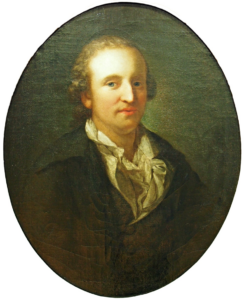Song in the time of someone's absence
(Poet's title: Lied in der Abwesenheit)
Set by Schubert:
D 416
[April 1816]
Ach mir ist das Herz so schwer,
Traurig irr’ ich hin und her,
Suche Ruhe, finde keine,
Geh ans Fenster hin, und weine.
Säßest du auf meinem Schoß,
Würd’ ich aller Sorgen los,
Und aus deinen blauen Augen
Würd ich Lieb und Wonne saugen.
Könnt ich doch, du süßes Kind,
Fliegen hin zu dir geschwind,
Könnt ich ewig dich umfangen
Und an deinen Lippen hangen!
Oh, my heart is so heavy!
Sadly, I pace up and down,
I am looking for calm but I do not find any,
I go up to the window, and I weep!
If you were sitting on my lap
I would be free of all care,
And from your blue eyes
I would be able to suck up love and bliss!
Oh, you sweet child, if only I could
Fly over to you immediately!
If only I could embrace you for ever
And attach myself to your lips!
All translations into English that appear on this website, unless otherwise stated, are by Malcolm Wren. You are free to use them on condition that you acknowledge Malcolm Wren as the translator and schubertsong.uk as the source. Unless otherwise stated, the comments and essays that appear after the texts and translations are by Malcolm Wren and are © Copyright.
☙
Themes and images in this text:
Arms and embracing Blue Detours and delusions Eternity Eyes Flying, soaring and gliding Food, feeding and nursing Hearts Kissing Lap, womb (Schoß) Lips Rest Sweetness Tears and crying Windows Walking and wandering
The rhyme scheme is, to say the least, simple. The couplets serve to evoke the simplicity of the emotion that motivates the poet, and capture some of the infantilism that results from his frustration. The absence of the beloved elicits the lover’s ‘baby talk’ (‘sweet child’, ‘sit on my lap’ etc.) and this is reflected in a poetic structure that is close to doggerel.
Some of the rhymes seem to be chosen deliberately to evoke early childhood:
Suche Ruhe finde keine,
Geh ans Fenster hin, und weine!
(where ‘keine’, none, is rather like the ‘all gone’ that we say to toddlers when they have finished their meal, and the ‘weine’, weep, reminds us of the wailing noise that usually follows);
Sässest du auf meinem Schoß,
Würd ich aller Sorgen los
(this might relate to games where parents sit children in their laps, Schoß, and then open their legs so that the kid almost falls, los);
Und aus deinen blauen Augen
Würd ich Lieb’ und Wonne saugen
(the Augen / saugen, eyes / suck or suckle, rhyme takes the imagery back to the earliest days of infancy: the eyes emit liquid and so become a metaphor for nipples in the ultimate infantilasation).
☙
Original Spelling Lied in der Abwesenheit Ach, mir ist das Herz so schwer! Traurig irr' ich hin und her, Suche Ruhe finde keine, Geh ans Fenster hin, und weine! Sässest du auf meinem Schooß, Würd ich aller Sorgen los, Und aus deinen blauen Augen Würd ich Lieb' und Wonne saugen! Könnt' ich doch, du süsses Kind, Fliegen hin zu dir geschwind! Könnt ich ewig dich umfangen, Und an deinen Lippen hangen!
Confirmed by Peter Rastl with Gedichte der Brüder Christian und Friedrich Leopold Grafen zu Stolberg. herausgegeben von Heinrich Christian Boie. Leipzig, in der Weygandschen Buchhandlung. 1779, page 146; and with Poetische Blumenlese für das Jahr 1777. Herausgegeben von Joh. Heinr. Voß. Hamburg, bey Carl Ernst Bohn, page 101.
To see an early edition of the text, go to page 93 [107 von 238] here: http://digital.onb.ac.at/OnbViewer/viewer.faces?doc=ABO_%2BZ160626609


